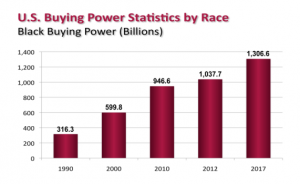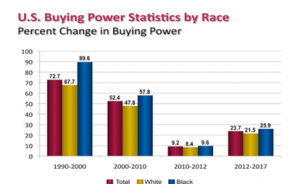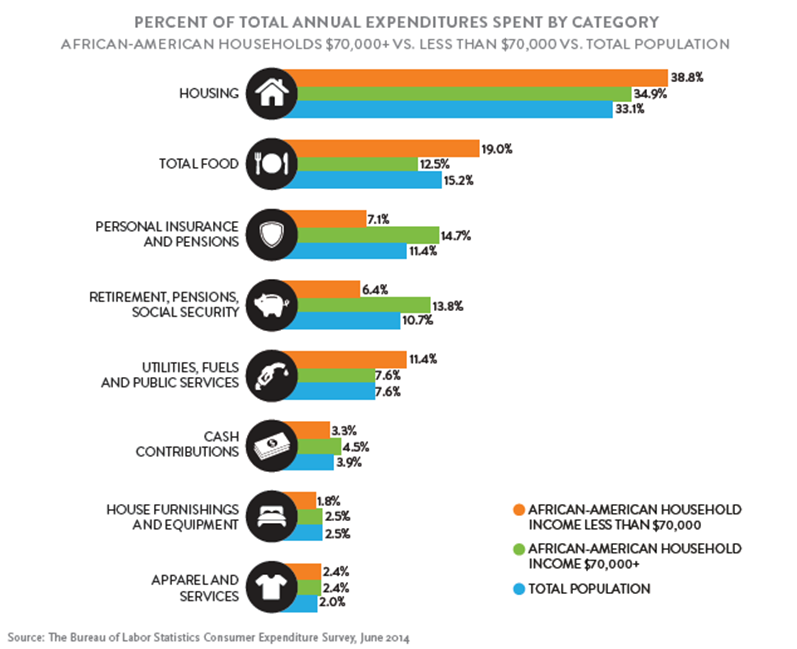
Hot Topics
Do YOU Value the African American Dollar?
June 2, 2017
I’m a woman with a four-year college degree, a respectable income, investments, and a child (who attends private school). I own a pet, two cars, my own home, which I have refinanced before. I have loans, I travel (both domestically and internationally), I volunteer, I attend church, I donate money to various organizations, I have between 6 to 10 credit cards with interest rates in very respectable ranges, and all three of my reported credit scores are above 720. Oh, and did I mention that I’m black/African American?
I mention all this to say, “Why, when I listen to Urban radio stations, are a large number of the commercial advertisers gearing their message to listeners who are perceived to be uneducated, in need of a cash advance (“Cash your check at our check-cashing store!”), unable to finance a new car – or any car for that matter?
When I hear these commercial advertising messages, I don’t know who to be mad at first – the advertiser for thinking that Urban/African American listeners are ONLY these things or the radio station(s) for continuing to allow advertisers to think in this limited fashion.
I’m not sure when or how the perception grew that Urban/African American listeners are not valuable consumers. For example, it’s amazing to me to the number of mainstream advertisers that do not even advertise on Urban stations to African American consumers. I hear comments such as, “African Americans do not use my products or services.” That’s when I think to myself or say, “Have you ever invited them to buy your products or services?”
African Americans have continually felt excluded as viable consumers from many businesses. If you, as an advertiser, are concerned that African Americans are not visiting your stores or purchasing your products, it’s most likely because you have not invited them to. When African Americans see/hear advertisements marketed toward them, the company will then become credible and trustworthy to them.
I think a lot of these perceptions can be changed as long as we continue to share the facts, and educate our advertisers about African American/Urban listeners. Below are some facts regarding African Americans in the U.S.
- There are 43 million African Americans in the U.S, 13.7% of the total population.
- The median age is 32 and 47% are under 35 years of age.

- African American buying power will continue its dramatic rise – $316 billion in 1990 to $600 billion in 2000, to $947 billion in 2010, to $1,038 billion in 2012, and a projected $1,307 billion by 2017.
- The 73% gain from 2000 to 2012 outpaces the 60% increase in White buying power and the 67% increase in total buying power (all races combined) for the same period. In 2012, African American share of the nation’s total buying power will be 8.5%, up from 8.2% in 2000 and 7.5% in 1990. And their share is expected to rise to 8.7% by 2017, accounting for almost nine cents out of every dollar spent.
- African American Households earning $75,000 or more grew more than 60% faster than the rest of the population.

- Categories where higher-income African Americans outspend the total population in terms of percentage of income include future-oriented categories, such as insurance policies, pensions, and retirement savings. Additionally, 4.5% of African-Americans earning $70,000+ make cash contributions—compared to 3.9% of the total population.
So what does all this mean for you the advertiser? It means if my business objective is to make money, does it matter to me what ethnic group is buying my goods or services, because ultimately all their money is great.
So what does all this mean for the radio stations? I leave you with questions: “Am I the one discrediting my listeners?”, “Do I really know who my listeners are?”, “Am I truly educating our advertisers about our listeners?”
We all have to be DIFFERENT and BETTER!
-Nakia Smith, Sr. Sales Research Consultant
Source: University of Georgia’s Selig Center for Economic Growth, 2012
Source: BlackEnterprice.com/small-business/African American buying power/November 28, 2013
Source: Increasingly Affluent, Educated and Diverse African-American Consumers: The Untold Story, 2015 The Bureau of Labor Statistics Consumer Expenditure Survey, June 2014

Comments